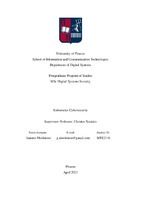Kubernetes cybersecurity

Master Thesis
Συγγραφέας
Μορφωνιός, Ιωάννης
Morfonios, Ioannis
Ημερομηνία
2023-04Επιβλέπων
Ξενάκης, ΧρήστοςXenakis, Christos
Προβολή/
Λέξεις κλειδιά
Kubernetes ; Security ; Virtualization ; ContainersΠερίληψη
Το Kubernetes είναι ένα ευρέως χρησιμοποιούμενο εργαλείο ενορχήστρωσης container που έχει ωφελήσει πολύ τον γρήγορο κύκλο ζωής ανάπτυξης λογισμικού. Η ικανότητά του να διαχειρίζεται χιλιάδες container και ορισμένα από τα βασικά χαρακτηριστικά του, όπως η διαχείριση κύκλου ζωής των container, η αυτόματη θεραπεία (auto-healing) και η αυτόματη κλιμάκωση (auto-scaling), το έχουν καταστήσει κορυφαία επιλογή για τη διαχείριση απαιτητικών φόρτων εργασίας, όπως εφαρμογές web μεγάλης κλίμακας. Ωστόσο, όπως και κάθε άλλο εργαλείο λογισμικού, το Kubernetes έχει επίσης το δικό του σύνολο αδυναμιών ασφαλείας. Κατά το παρελθόν έχουν ανακαλυφθεί πολλά τρωτά σημεία που επηρεάζουν τα στοιχεία του, αλλά ένα μεγάλο ποσοστό των επιτυχημένων παραβιάσεων ασφαλείας σε περιβάλλοντα Kubernetes δεν αποδίδονται στην πραγματικότητα σε ελαττώματα ασφαλείας στην ίδια την πλατφόρμα. Στην πραγματικότητα, οι πιο συνηθισμένες απειλές ασφαλείας που αντιμετωπίζει το Kubernetes δημιουργούνται από εσφαλμένες διαμορφώσεις στην παραμετροποίηση του. Λόγω της πολυπλοκότητας του Kubernetes και της απειρίας πολλών διαχειριστών, η προστασία ενός συμπλέγματος Kubernetes και του φόρτου εργασίας του, εξακολουθεί να αποτελεί πρόκληση για πολλές εταιρείες. Σε αυτή τη διατριβή, θα προχωρήσουμε στην ανάπτυξη και τη διαμόρφωση ενός συμπλέγματος Kubernetes, καθώς και στην επακόλουθη αξιολόγηση της ασφάλειας του με τη χρήση των εργαλείων σάρωσης ευπαθειών kube-hunter και Kubescape. Ο στόχος είναι να αξιολογηθούν πολλές πτυχές της ασφάλειας του συμπλέγματος χρησιμοποιώντας διάφορες τεχνικές σάρωσης, όπως εσωτερική και εξωτερική σάρωση, σάρωση αρχείων YAML, επιθεώρηση των στοιχείων του συμπλέγματος για τρωτά σημεία, ακόμη και εκτίμηση του συνολικού κινδύνου ασφάλειας. Για να γίνει η διαμόρφωση πιο ρεαλιστική, θα εισαχθούν πραγματικά σενάρια εσφαλμένης διαμόρφωσης στο σύμπλεγμα και θα αναπτυχθούν επίσης ορισμένα δείγματα εφαρμογών. Στη συνέχεια, ορισμένα από τα ελαττώματα ασφαλείας που θα ανακαλυφθούν, θα αξιοποιηθούν για να αποδειχθεί το μέγεθος της ζημιάς που θα μπορούσε να προκαλέσει ένας κακόβουλος παράγοντας στο σύμπλεγμα και στον φόρτο εργασίας του, αξιοποιώντας τα κενά ασφαλείας με τη χρήση κατάλληλων επιθέσεων. Τέλος, για να ενισχύσουμε αποτελεσματικά την ασφάλεια που παρέχει το σύμπλεγμα, θα αναλύσουμε και θα μετριάσουμε τυχόν ευπάθειες που ανακαλύφθηκαν που το εκθέτουν ενεργά σε κίνδυνο, ενώ θα αγνοήσουμε τυχόν ψευδώς θετικές ειδοποιήσεις (false positives).


